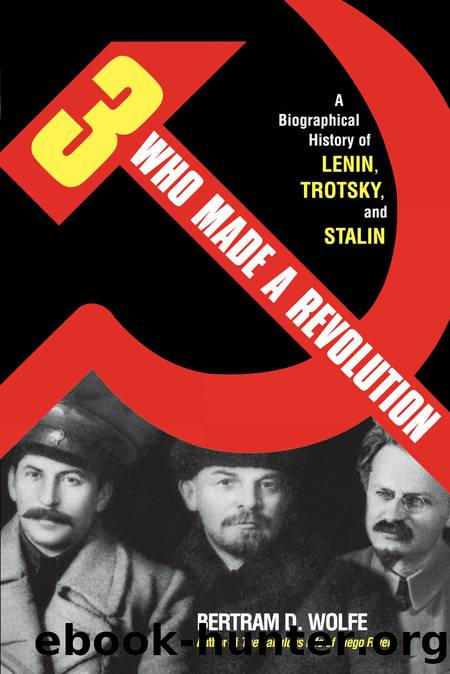Three Who Made a Revolution by Bertram D. Wolfe

Author:Bertram D. Wolfe
Language: eng
Format: epub
Publisher: Cooper Square Press
Published: 2001-09-15T00:00:00+00:00
Eight newspapers published the Manifesto and were suspended by the government. Next day one hundred newspapers did the same, constraining the government to refrain from further confiscations. There was a run on the banks. Abroad, government credit toppled. The government responded by arresting the entire Executive Committee of the Council of Workingmenâs Delegates on December 16. Their last act under Trotskyâs chairmanship, as the police were putting them under arrest, was to vote a new general strike and to smash their pistols so that they should not fall into the hands of their captors.
More workingmen struck in Russia during this single turbulent year than in any other country in any year up to that time. The government estimate is 2,800,000 workingmen involved, more than the entire number of industrial workers in the country, meaning that many workers must have struck more than once. The metal workers struck on an average more than three times during the year. In this as in other things, Saint Petersburg had led the nation. But now its workingmen were weary and exhausted. Besides, its most advanced workers knew only too well that this time the strike must end in armed insurrection or not be undertaken at all. They looked at their miserable weapons, and knew they were not prepared. Fresher, more backward Moscow, where the garrison was seething with unrest, picked up the challenge with yet another general strike. The railwaymen joined once more, butâa fateful factâthis time the railroad from Petersburg to Moscow did not close down.
The Moscow general strike, intended as part of an all-Russian general strike, began peacefully enough. The top leadership there had hesitated and had been pushed forward from below. But that leadership, lodged in a Moscow âfederal councilâ of united Bolsheviks and Mensheviks, was arrested the very day the strike began. The national leaders of the Bolsheviks were taken by surprise by what followed, too. They had just called a conference in Tammerfors, Finland, and all during the fateful days while Moscow was in general strike and armed insurrection, they were not in Russia proper. Second-string Moscow leaders and a few from other parts of the countryâBolsheviks, Social Revolutionaries and Mensheviksâdirected and organized as best they could what was in reality a spontaneous eruption. None of the men whose names we have become acquainted with were on the spot at all.
The moral responsibility if not the direct initiative for what happened in Moscow, was above all Leninâs and that of his party, and they did not reject it. From the day he first heard of the fate of Gaponâs procession he had been studying military tactics, writing detailed instructions on bombs, pistols, tacks and broken glass to disorganize the mounted Cossacks, barricades, propaganda in the armed forces, the acquisition of arms, the necessity of an armed insurrection. The Mensheviks, a little more hesitantly, had followed suit and Iskra had carried precise instructions on barricade fighting. The Social Revolutionaries had added proposals for individual terror. Troop mutinies and naval mutinies and peasant insurrections had contributed to the spirit of rebellion.
Download
This site does not store any files on its server. We only index and link to content provided by other sites. Please contact the content providers to delete copyright contents if any and email us, we'll remove relevant links or contents immediately.
| France | Germany |
| Great Britain | Greece |
| Italy | Rome |
| Russia | Spain & Portugal |
Fanny Burney by Claire Harman(26603)
Empire of the Sikhs by Patwant Singh(23086)
Out of India by Michael Foss(16853)
Leonardo da Vinci by Walter Isaacson(13336)
Small Great Things by Jodi Picoult(7142)
The Six Wives Of Henry VIII (WOMEN IN HISTORY) by Fraser Antonia(5515)
The Wind in My Hair by Masih Alinejad(5095)
A Higher Loyalty: Truth, Lies, and Leadership by James Comey(4964)
The Crown by Robert Lacey(4817)
The Lonely City by Olivia Laing(4802)
Millionaire: The Philanderer, Gambler, and Duelist Who Invented Modern Finance by Janet Gleeson(4478)
The Iron Duke by The Iron Duke(4356)
Papillon (English) by Henri Charrière(4274)
Sticky Fingers by Joe Hagan(4198)
Joan of Arc by Mary Gordon(4110)
Alive: The Story of the Andes Survivors by Piers Paul Read(4032)
Stalin by Stephen Kotkin(3965)
Aleister Crowley: The Biography by Tobias Churton(3640)
Ants Among Elephants by Sujatha Gidla(3467)
